Maximize ROI with Effective AI Consulting Strategies
Artificial intelligence (AI) has become a true game changer for businesses across industries. By enabling organizations to stay ahead of the competition, AI drives tangible results that transform operations and decision-making.
Partnering with expert AI consulting services allows companies to develop cutting-edge AI strategies tailored to their unique business goals. With the right AI solutions in place, businesses can improve operational efficiency, reduce time-consuming tasks, and gain deeper insights into customer behavior.
These AI initiatives empower confident decision making and unlock new avenues for growth. Collaborating with experienced AI consulting firms helps clients discover innovative ways to transform their operations and realize the full potential of AI technologies.
Key Takeaways
-
Successful AI consulting requires the right capabilities needed to integrate AI solutions seamlessly into business operations, ensuring alignment with business goals and fostering real-time based decision making.
-
Leveraging real-time based AI tools enhances predictive analytics and intelligent automation, enabling businesses to respond swiftly to customer behavior and market changes.
-
Developing comprehensive AI strategies with a focus on capabilities needed and real-time based insights empowers organizations to realize measurable results and maintain a competitive advantage in a rapidly evolving landscape.
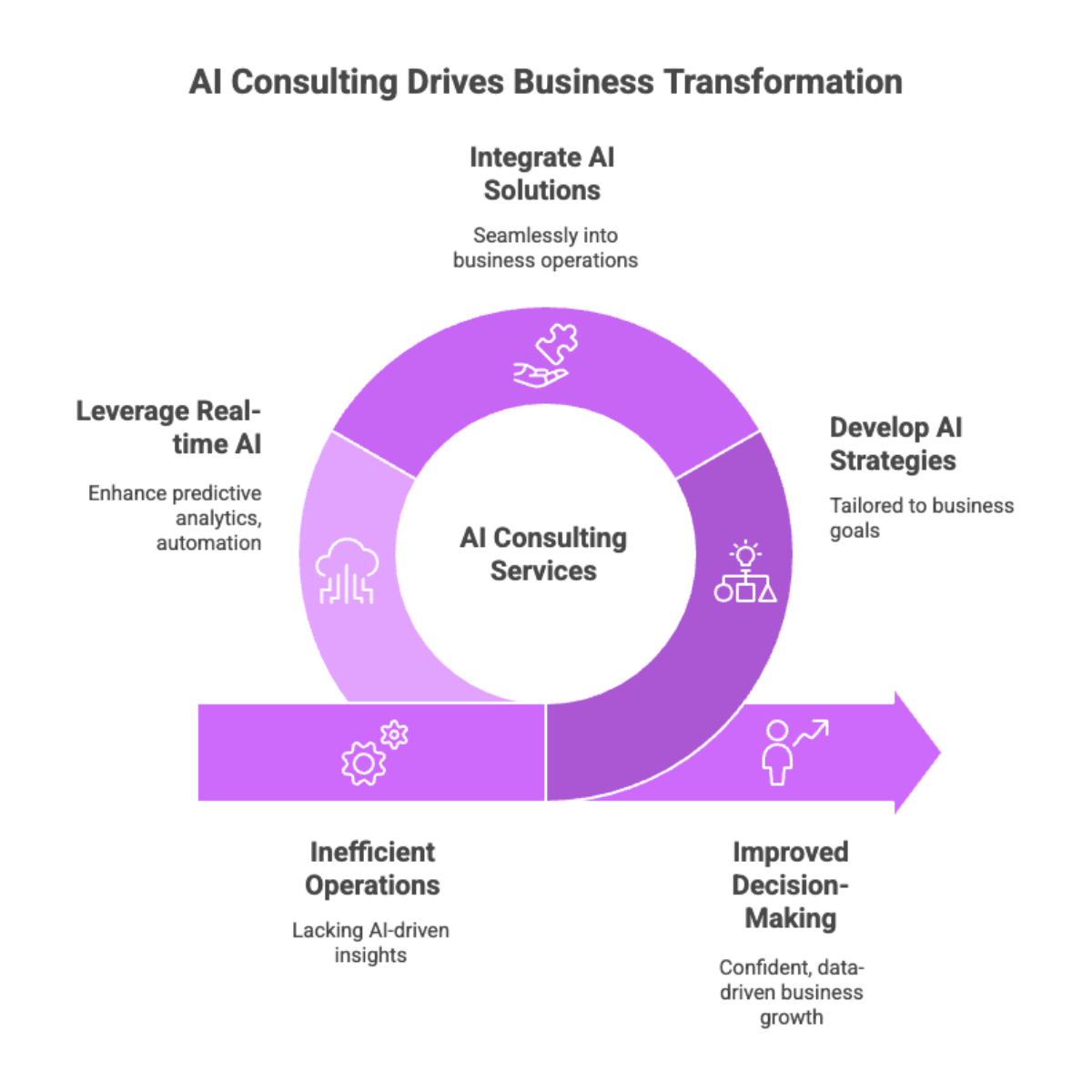

Benefits of AI Consulting Services
AI consulting services deliver a wide array of benefits that enhance business value and competitive advantage. Through improved predictive analytics, intelligent automation, and optimized supply chain management, companies can streamline operations and reduce costs. Custom AI solutions are designed to meet the specific needs of each organization, driving measurable cost savings and operational efficiency.
Moreover, AI services help businesses overcome common challenges such as data management complexities, security risks, and the hype surrounding AI adoption. By providing clear insights and ongoing support for AI investments, consulting firms enable real-time decision making that aligns with business objectives. Effective performance measurement ensures AI initiatives consistently deliver measurable results that support long-term success.
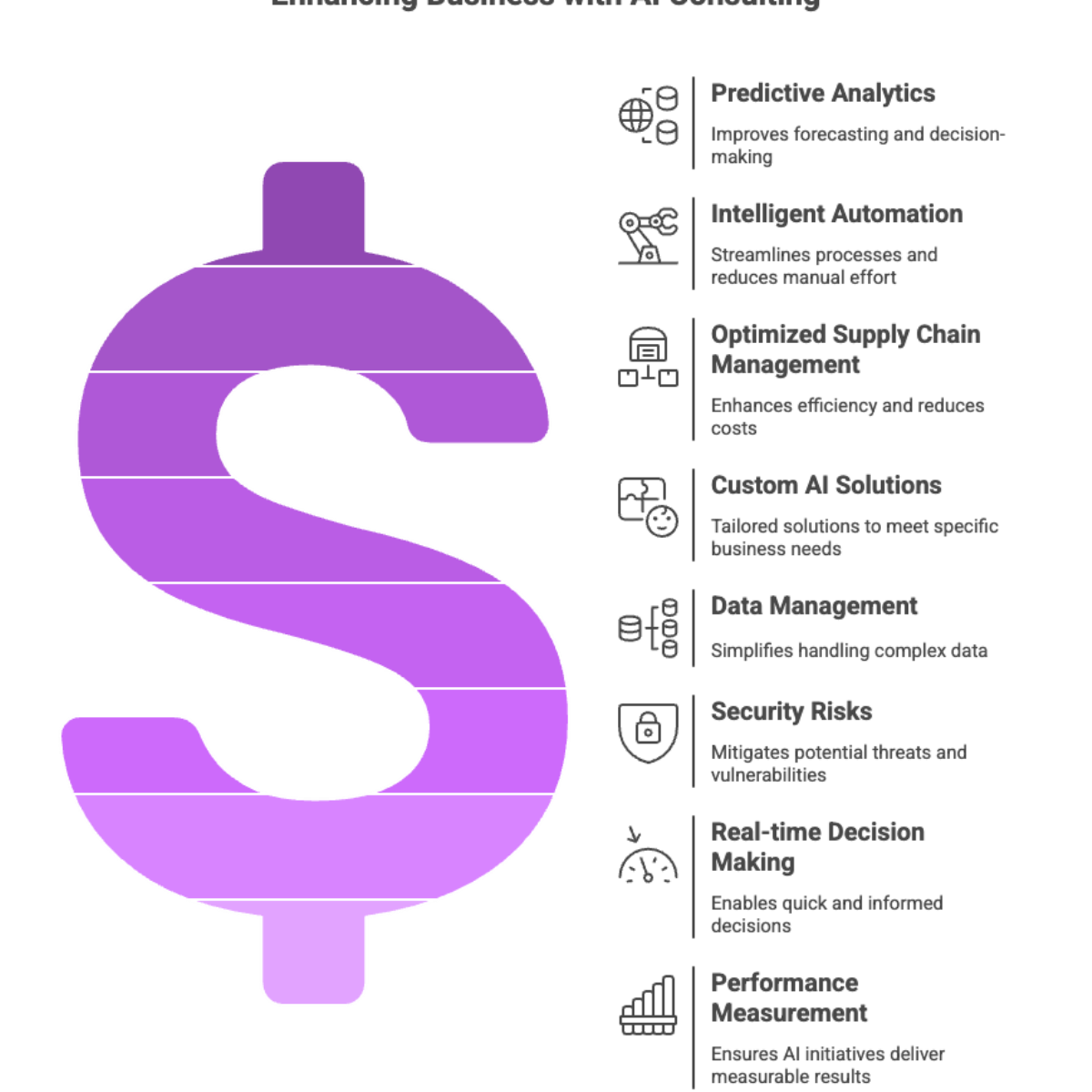

Developing an AI Strategy
Crafting an effective AI strategy requires deep expertise and awareness of the latest technologies and future trends. AI consulting firms guide organizations in creating comprehensive strategies that align with their business goals and objectives. A successful AI strategy incorporates change management to equip teams with the necessary capabilities to implement and manage AI solutions effectively.
By focusing on people, processes, and technology, businesses can realize AI’s full potential, transforming workflows and achieving significant returns on investment. This strategic approach ensures AI initiatives are scalable, secure, and ethically deployed, fostering sustainable business transformation.

AI Solutions for Business
AI solutions have broad applicability across various business functions including marketing, customer service, and operations. Generative AI technologies enable the creation of innovative tools such as chatbots and virtual assistants, which enhance customer experience and improve operational efficiency. AI agents can automate repetitive tasks, freeing human resources to focus on strategic and creative work. Leveraging AI-driven innovations helps businesses improve asset management, reduce operational costs, and achieve significant cost savings.
These advancements open new opportunities for growth and help companies maintain a competitive edge in their industries by continuously optimizing processes and customer engagement.
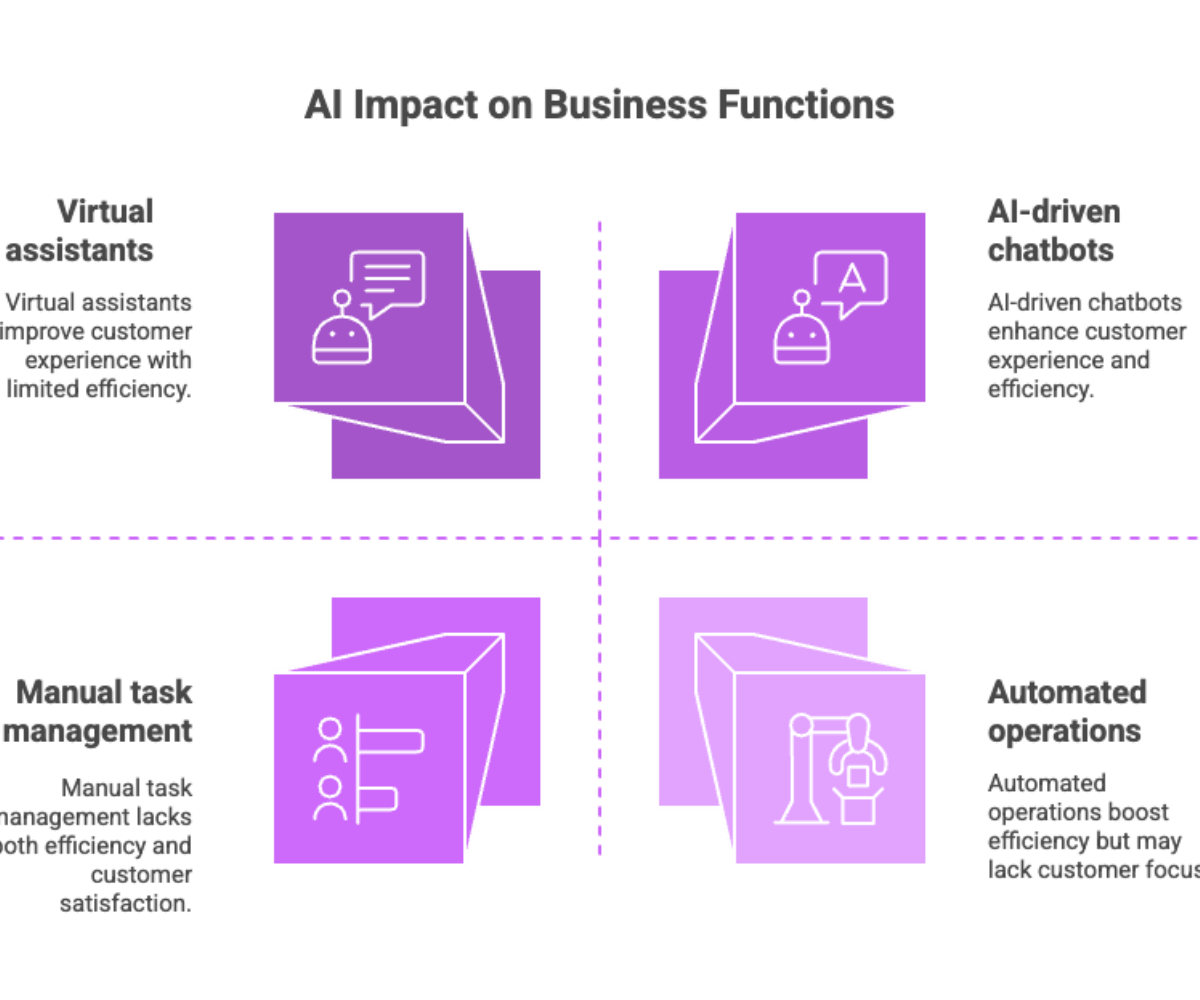

Leveraging AI Tools
AI tools provide powerful capabilities to analyze vast amounts of data, delivering valuable insights that drive informed business decisions. Predictive analytics forecast customer behavior, identify emerging trends, and optimize advertising and marketing strategies in real time.
Additionally, AI tools automate routine tasks such as data entry and bookkeeping, reducing human error and boosting operational efficiency. By integrating these intelligent automation solutions, businesses stay ahead of the competition and secure a sustainable competitive advantage.
The use of advanced AI tools also supports continuous performance measurement and optimization, ensuring AI initiatives remain aligned with evolving business needs.
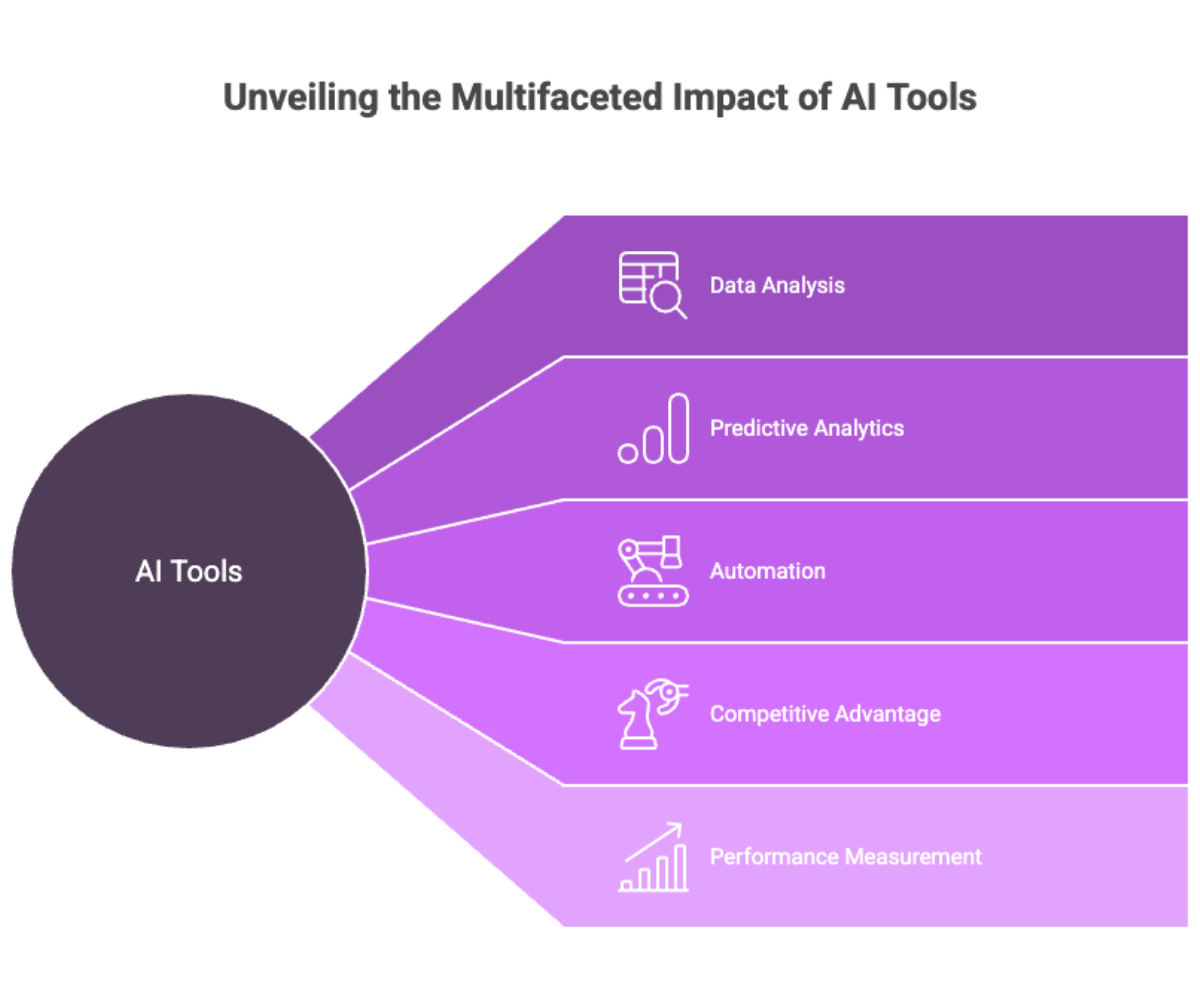

AI Tools: Advanced Examples for Developers
Below is a table showcasing advanced AI tools and platforms that developers can leverage to build, deploy, and optimize AI solutions. These tools cover a broad spectrum of AI capabilities including machine learning frameworks, generative AI models, automation platforms, and deployment infrastructure. Each tool is selected for its technical robustness, scalability, and suitability for enterprise-grade AI initiatives.
|
Tool / Platform |
Primary Use Case |
Key Features |
Developer Focus |
Integration & Deployment |
|---|---|---|---|---|
|
TensorFlow |
Machine Learning Framework |
Open-source library for numerical computation; supports deep learning, scalable training |
Extensive API support (Python, C++, JavaScript); model customization; distributed training |
Supports cloud, edge, and on-prem deployment |
|
PyTorch |
Machine Learning & Deep Learning |
Dynamic computational graph; strong support for research and production |
Flexible model building; strong community support; easy debugging |
Integration with TorchServe for deployment |
|
OpenAI API |
Generative AI & Language Models |
Access to GPT, Codex models for text generation, code generation, and fine-tuning |
RESTful API; supports prompt engineering; fine-tuning capabilities |
Cloud-based, scalable API endpoints |
|
Hugging Face Transformers |
NLP and Multimodal Models |
Pretrained models for NLP, vision, and audio tasks; model hub for sharing |
Python SDK; supports fine-tuning and transfer learning; large model repository |
Easy deployment with ONNX, TorchServe |
|
Kubeflow |
ML Workflow Orchestration |
End-to-end orchestration of ML pipelines on Kubernetes |
Pipelines for training, tuning, and deployment; supports multiple frameworks |
Kubernetes-native, scalable deployment |
|
MLflow |
Machine Learning Lifecycle Management |
Experiment tracking, model registry, and deployment tooling |
Language-agnostic APIs; supports reproducibility and versioning |
Supports deployment to cloud and on-prem |
|
Apache Airflow |
Workflow Automation |
Programmatic scheduling and monitoring of workflows |
Python-based DAGs; extensible operators for ML workflows |
Scalable deployment in distributed environments |
|
NVIDIA Triton Inference Server |
Model Serving & Deployment |
High-performance inference server supporting multiple frameworks |
Supports TensorFlow, PyTorch, ONNX models; dynamic batching; GPU acceleration |
Containerized deployment, multi-GPU support |
|
DataRobot |
Automated Machine Learning (AutoML) |
End-to-end platform for building and deploying ML models |
Automated feature engineering; model interpretability; API access |
Cloud and hybrid deployment options |
|
Microsoft Azure ML |
Cloud-based AI Platform |
Comprehensive AI and ML services including AutoML, MLOps, and model deployment |
SDKs for Python and R; drag-and-drop designer; integrated DevOps tools |
Seamless integration with Azure ecosystem |
This selection of AI tools empowers developers to design sophisticated AI architectures, streamline model training and deployment, and maintain scalable, secure AI operations aligned with enterprise requirements. Leveraging these platforms accelerates the delivery of custom AI solutions that drive measurable business value and operational efficiency.

Change Management and Implementation
Successful AI adoption requires thoughtful change management to ensure smooth transitions and minimize disruption. AI consulting firms provide expert guidance to help organizations manage change effectively, ensuring teams possess the skills and knowledge necessary to work confidently with AI solutions. The implementation process emphasizes security, governance, and risk management to guarantee responsible and ethical deployment of AI technologies. By managing change proactively, businesses can accelerate AI adoption, achieve rapid returns on investment, and realize lasting transformation that supports future growth.
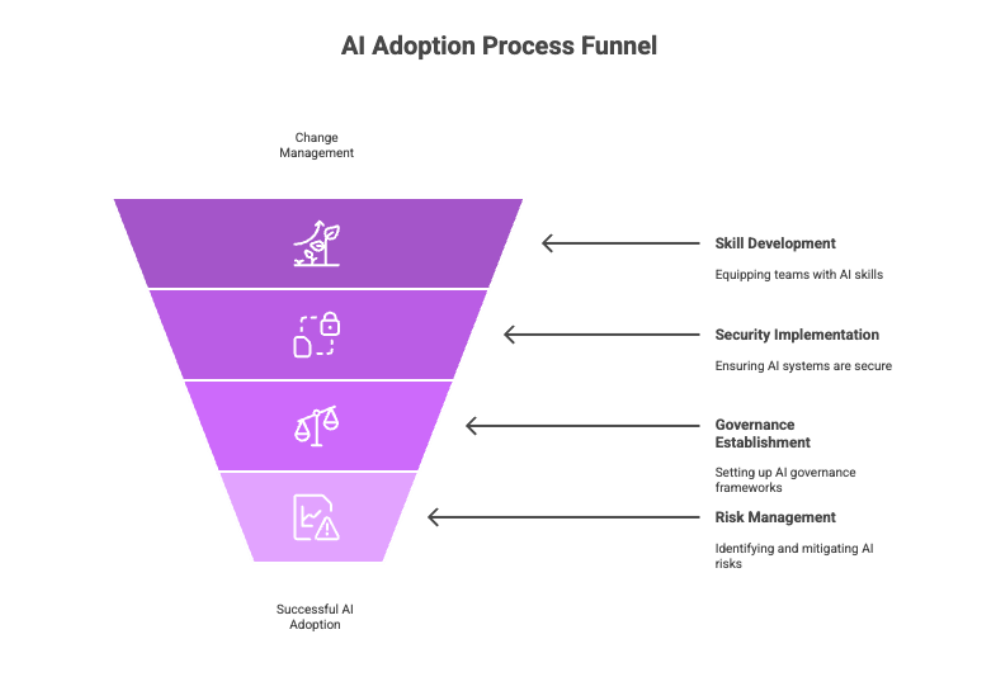

Asset Management and Optimization
AI plays a critical role in optimizing asset management by reducing costs and enhancing overall efficiency. AI solutions continuously monitor assets, predict maintenance needs, and optimize resource allocation to improve utilization and reduce downtime. These capabilities contribute to significant cost savings and operational improvements. Furthermore, AI enhances supply chain management by improving logistics, forecasting demand, and minimizing the risk of disruptions. By leveraging AI-driven asset management and supply chain optimization, businesses can increase resilience and maintain competitive advantage in dynamic markets.
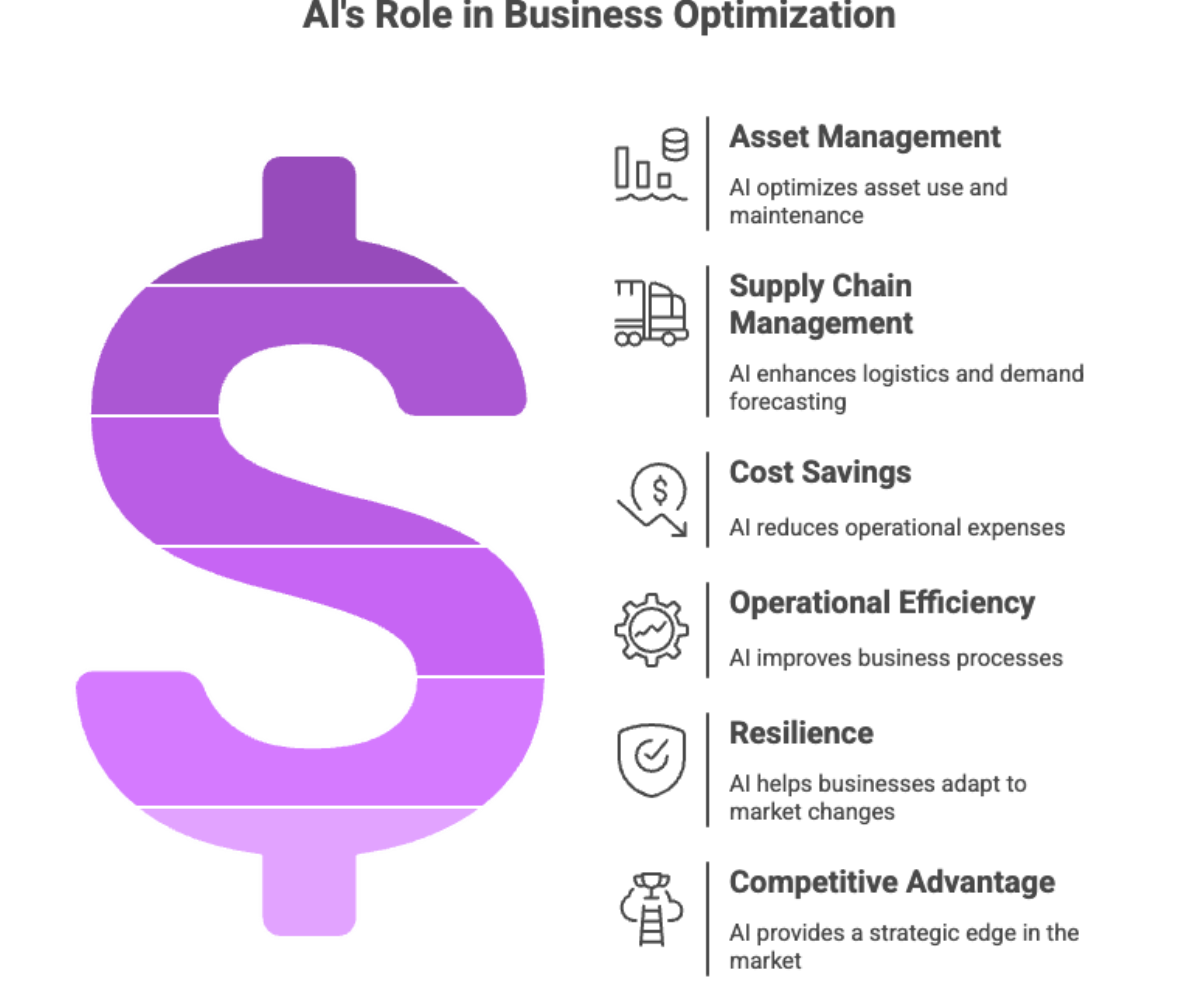

Cost Savings and ROI
AI solutions are instrumental in driving substantial cost savings and improving return on investment. Automating repetitive tasks, enhancing operational efficiency, and optimizing asset management all contribute to reduced expenses and increased profitability. AI consulting firms assist businesses in measuring the ROI of AI initiatives, ensuring investments align with strategic business objectives. By leveraging AI effectively, organizations achieve tangible results that fuel growth, improve customer satisfaction, and strengthen their position within the industry.
Comparison of Cost Savings and ROI for Diverse AI Uses
|
AI Use Case |
Cost Savings Impact |
ROI Potential |
Key Benefits |
|---|---|---|---|
|
Automating Repetitive Tasks |
High - reduces labor costs and errors |
High - quick implementation and savings |
Frees up human resources for strategic work |
|
Operational Efficiency |
Medium to High - optimizes workflows |
Medium to High - improves productivity |
Streamlines processes and reduces delays |
|
Asset Management |
High - minimizes downtime and maintenance costs |
High - extends asset lifespan and utilization |
Predictive maintenance and resource optimization |
|
Supply Chain Optimization |
Medium - reduces inventory and logistics costs |
Medium to High - improves supply chain resilience |
Enhances demand forecasting and reduces disruptions |
|
Predictive Analytics |
Medium - prevents costly mistakes |
High - enables proactive decision-making |
Identifies trends and customer behavior early |
|
Customer Service Automation |
Medium - lowers support costs |
Medium - improves customer satisfaction |
Provides 24/7 support and faster response times |
|
Marketing Optimization |
Medium - reduces ad spend waste |
High - increases campaign effectiveness |
Enables smarter targeting and personalization |
This table highlights how different AI applications contribute to cost savings and ROI, helping businesses prioritize AI initiatives based on their strategic goals and expected financial impact.

Future Trends in AI
The future of AI is filled with exciting innovations and emerging trends that will continue to reshape business landscapes. Generative AI, predictive analytics, and intelligent automation represent some of the key technologies driving this evolution. AI consulting firms play a vital role in helping clients stay ahead of the curve by adopting the latest advancements and integrating them into their business models. Embracing these future trends enables organizations to gain a competitive advantage, foster innovation, and sustain long-term growth in an increasingly digital world.
Private AI, Edge AI, and Local LLMs
|
Future Trend |
Description |
Business Impact |
Key Benefits |
|---|---|---|---|
|
Private AI |
AI technologies designed to operate with enhanced data privacy and security, ensuring sensitive information remains protected. |
Enables organizations to leverage AI capabilities while complying with strict data privacy regulations and safeguarding customer data. |
Increased trust, regulatory compliance, and secure AI adoption without compromising performance. |
|
Edge AI |
Deployment of AI models directly on edge devices (e.g., IoT devices, smartphones) rather than centralized cloud servers. |
Reduces latency, lowers bandwidth costs, and allows real-time AI processing closer to data sources. |
Faster decision-making, improved operational efficiency, and enhanced user experiences. |
|
Local LLMs (Large Language Models) |
Running powerful language models on local infrastructure or devices, minimizing reliance on cloud services. |
Provides greater control over data, lowers dependency on external providers, and enhances responsiveness. |
Improved data privacy, reduced latency, and customized AI solutions tailored to specific needs. |
This table highlights key future trends shaping the AI landscape, emphasizing privacy, decentralization, and control. Businesses adopting these innovations can expect to gain competitive advantage, boost operational efficiency, and meet evolving customer expectations in a secure and scalable manner.

Consulting Services for AI
AI consulting services provide essential expertise and guidance throughout the AI journey. From strategy development and solution design to change management and implementation, consulting firms support businesses in maximizing the value of their AI investments. Leveraging the knowledge and experience of AI consultants ensures AI initiatives are executed successfully and deliver measurable results. These services empower organizations to achieve their business goals, enhance operational efficiency, and drive growth by transforming their AI capabilities and embedding intelligent automation across functions.
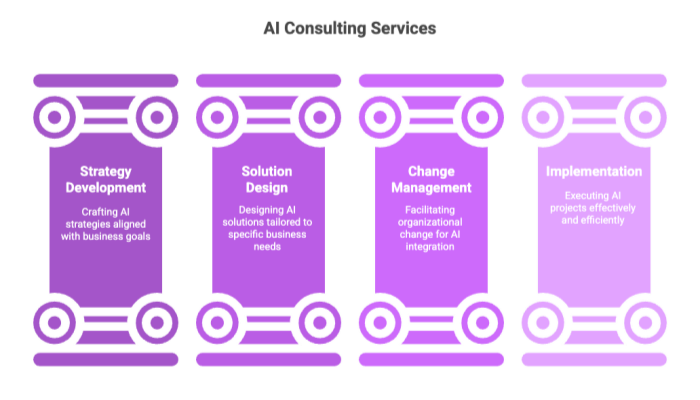

Realizing the Full Potential of AI
To unlock the full potential of AI, businesses must invest in cutting-edge technologies and adhere to industry best practices. AI consulting firms assist clients in developing and implementing strategies that generate significant business value and measurable outcomes. Through strategic AI adoption, organizations achieve cost savings, operational improvements, and accelerated growth. The promising future of AI offers vast opportunities, and businesses that embrace these technologies will be well-positioned to stay ahead of the competition and capitalize on emerging market trends.

